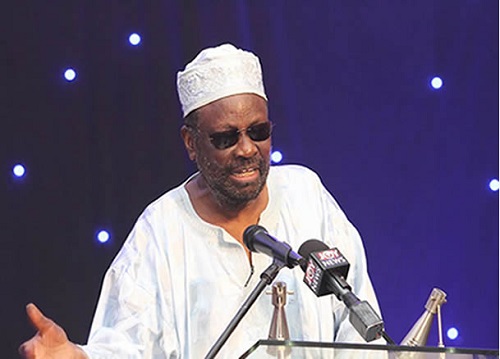There is no doubt that Ghana’s attempt to tame the Covid-19 pestilence has achieved notable success.
But I repeat what I have said before: we must not be complacent.
My impression is that our health authorities are so anxious to be positive; to demonstrate that they are doing their best, that if we don’t take care, they will lead us down the garden path.
Of course, everyone will welcome “good news” in conditions of utter gloom. But if we don’t ask the hard questions, the scientists will tell us what they want us to hear. And when reality catches up with the fables, everyone will be embarrassed.
That’s why I am cautioning that the following question should be fully answered: as of the time of writing this piece, the information available on the Ministry of Health Covid-19 webpage is this:
QUOTE:
Confirmed Cases – 8,885
Recoveries – 3,189
Deaths – 38.
UNQUOTE
If you do the arithmetic, you will find that there are 5,656 people still undergoing treatment from the disease.
But that figure, by itself, is not so important. The important figure, which is missing from those published by the health authorities, is this: how many tests were conducted to yield the number of confirmed cases (8,885)?
The reason why the missing figure is important is that it is only the number of tests carried out that will give us an accurate estimate of the prevalence of the disease in the country.
For instance, if it was out of 10,000 tests that the figure of 8,885 emerged, the percentage of confirmed cases from 10,000 tests would be 88.85%. That would be more alarming than if the 8,885 figure had emerged from 100,000 tests. In that case, the percentage of confirmed cases emerging from the sample of tests would be only 8.885%.
The next question is this: why aren’t the health authorities giving us the figures in a manner that can easily help us to determine the actual extent (as far as is possible) of the existence of the disease among our population?
The temptation to “manipulate” figures with regard to the prevalence of the disease is quite common, I am afraid. In the UK, for example, it has been detected by a wary media, helped by whistle-blowers, that the British government was, at one stage, counting the number of test kits issued to hospitals as ACTUAL TESTS carried out!
Again, in the UK, government figures given with regard to the supply of personal protection equipment (PPE) were found to be largely theoretical (if not fictitious!).
Frontline health workers were crying daily for PPE, whilst they were being falsely told that their establishments had been supplied with PPE already. The extent of governmental mendacity over such matters was blown wide open when a Royal Air Force plane sent to Turkey to bring a consignment of PPE was found to have been loaded with defective PPE.
How could that happen in the UK, one of the countries whose commercial systems invented the terms, “pre-shipment inspection” and “due diligence”?
A first-rank mercantile country like the UK importing equipment from third-rank Turkey at a time of national emergency? Yet it happened. And worse, despite what might be considered to be typical British snobbery against the manufacturing prowess of Turkey, there was no due diligence done before the importation from Turkey!
I am laying emphasis on this point because we in Ghana still regard British standards of behaviour – both in the commercial and scientific spheres – as something worthy of emulation.
Now, back to the Ghana Covid-19 situation. One of the most advanced countries in Africa, with regard to scientific matters, is South Africa. And South Africa finds it necessary, no doubt because its government respects the comprehension abilities of the general population, to tell the populace things like this:
QUOTE: “Currently, the National Health Laboratory Service is conducting an average of 60,000 tests a week with the kits it has available. But the backlog of unprocessed specimens at the end of May accounted for more than a third of tests for that month. UNQUOTE
Isn’t that wonderfully informative?4
But wait: the South Africans are then given week-by-week numbers of tests carried out. Interested people can then look for other figures against which to compute the number of tests. Like this: Confirmed Cases: 40,792 (+3,267); Recovered: 21,311; Deaths 848 (+56).
Neat, isn’t it? What I am driving at is that the health authorities there do not presume that the populace don’t want to know the detailed situation, as portrayed by the figures. Nor do the authorities imagine that the populace won’t understand the figures, if provided.
Now, that attitude stems, basically, from a philosophy of communication. The South African health authorities recognise that what affects everyone, should be made known to everyone. UNMASSAGED! Otherwise, not everyone will accept his or her part in fighting the disease.
Right now, if you go to most building sites in Accra, you will find that about nine out of ten of the workers do not wear face masks. The wearing of masks appears to be voluntary at many establishments. Should that be so?
The workers will be found to be going in and out of the site office in droves.
No hand-washing. No observation of “social distance”. They laugh and chat as usual.
Yet we face a horrible disease that has attacked and humiliated some of the most advanced nations in the world (technologically speaking). The USA alone: about 100,000 deaths. The UK, Brazil, Italy, Spain, and France, and even Germany, are in hot pursuit.
God has blessed Ghana, so far. Let us not take His Grace for granted. Please!
By CAMERON DUODU


